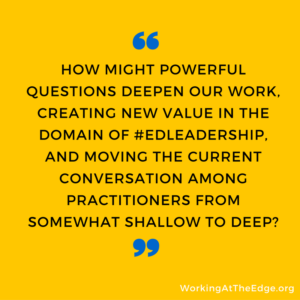 I enjoy reading several books concurrently. It’s useful for making connections between different, sometimes divergent, ideas. Two reads that I’ve been thinking about lately: A More Beautiful Question: The Power of Inquiry to Spark Breakthrough Ideas by Warren Berger (listen to our podcast with Warren on TLTalkRadio) and Deep Work: Rules for Focused Success in a Distracted World by Cal Newport.
I enjoy reading several books concurrently. It’s useful for making connections between different, sometimes divergent, ideas. Two reads that I’ve been thinking about lately: A More Beautiful Question: The Power of Inquiry to Spark Breakthrough Ideas by Warren Berger (listen to our podcast with Warren on TLTalkRadio) and Deep Work: Rules for Focused Success in a Distracted World by Cal Newport.
First, some definitions from the authors:
A beautiful question: A beautiful question is an ambitious yet actionable question that can begin to shift the way we perceive or think about something—and that might serve as a catalyst to bring about change.
Deep work: Professional activities, performed in a state of distraction-free concentration, that push your cognitive capabilities to their limit. These efforts create new value, improve your skill and are hard to replicate.
Shallow work: Non-cognitively demanding logistical-style tasks often performed while distracted. These efforts tend to not create much new value in the world and are easy to replicate.
I’ve previously written about the idea of practitioner inquiry and am starting to see the intersection of powerful questions and deep work to elevate the #edleadership conversation. How might powerful questions deepen our work, creating new value in the domain of #edleadership, and moving the current conversation among practitioners from somewhat shallow to deep? Here are some examples of powerful questions I’ve recently discovered.
From Yong Zhao on the recent US PISA score report:
- Does it [PISA] actually measure what matters?
- How does it assess skills needed for an uncertain future with such certainty?
- Does its results in reading, math, and science accurately capture the domains of expertise each individual needs for successful participation in the future society anywhere in the world?
Or these from Alan November on our tendency in classrooms to be technology rich and innovation poor:
- Did the assignment build capacity for critical thinking on the web?
- Did the assignment develop new lines of inquiry?
- Are there opportunities for students to make their thinking visible?
- Are there opportunities to broaden the perspective of the conversation with authentic audiences from around the world?
- Is there an opportunity for students to create a contribution (purposeful work)?
- Does the assignment demo “best in the world” examples of content and skill?
These are some of the most rich questions I’ve encountered that can inspire deeper work and conversation inside and outside of our schools. How do leaders design beautiful questions like these that connect with learning and learner-centered environments? How do leaders build the capacity of everyone across the organization to design better questions? How might we use quantitative and qualitative data in designing questions? How might we use tools like thinking routines to assist us in uncovering rich, beautiful questions?
In Salisbury, we are always asking questions about our work. The questions we asked several years ago (along with the deep work of finding answers) have resulted in changes in learning in the classroom. Learn more about this action research project by listening to this podcast.
- What are the critical factors of success for our teachers who are creating transformational learning experiences (as defined by SAMR)?
- Which factors can the district foster?
The learning won’t stop there, though! The #edleadership questions we’re inspired to go deeper with this coming year focus on shifting from a school-centered paradigm to a learner-centered paradigm:
- Why do we need to change the way we think about education – from a school-centered paradigm to a learner-centered paradigm? What contextual factors of the future are driving this non-negotiable for change?
- What if leading our schools and organizations through a learner-centered paradigm required new sets of knowledge, skills and attitudes? What would they be?
- How might we help school leaders acquire new knowledge, skills and attitudes and apply their new learning to actually changing how we do school?
Look for some deep work in this area as we enter the new year! Sign up for updates as a new project is rolled out in January 2017.
What beautiful questions are you asking about your practice? How might you push your cognitive capabilities to deepen your work?
Connect with Randy on Twitter and on the TLTalkRadio podcast!
Get new content delivered to your inbox and the ebook 3 Key Principles of Digital Transformation. The ebook contains valuable information from my experience leading a digital transformation and working with a variety of stakeholders over the past decade.
- A silver lining - January 22, 2022
- Is our use of tech working against us? 🤔 - September 8, 2021
- What’s NOT going to change in the next 10 years? 🤔 - September 7, 2021
Good article. My book Now That’s a Good Question! How to Promote Cognitive Rigor Through Classroom Questioning from ASCD addresses how good questions engage students in deeper learning experiences. http://www.tinyurl.com/nowthatsagq
Articulate with deeper thinking process , assimilate whole intrinsically, inner most thinking process, embrace all of us to change , to adjust with changing phenomenal of environment.
Deeper learning procedure is so simple
very useful to each one
Roop Singh Dhakad
Bharat (India), Jaipur